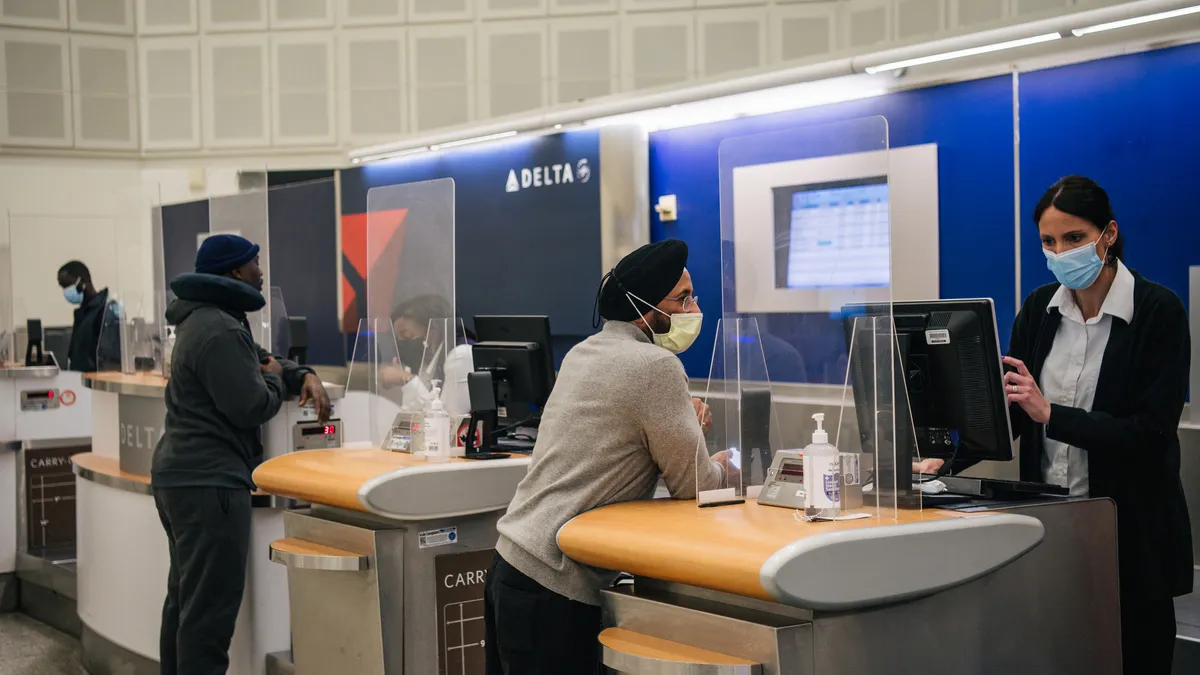Dive Brief:
- American Express reported on Friday that its first-quarter revenue, excluding interest expense, rose 29% to $11.7 billion, thanks partly to the return of travel demand. Its total network payment volume climbed 30% to $350 billion.
- Nonetheless, net income slipped 6% to $2.1 billion compared to the quarter last year as expenses climbed. Overall expenses rose 14.5% to $9.06 billion, due partly to expenses related to the travel increase, the company said.
- Amex CEO Stephen Squeri said the travel demand increase reflects pent-up demand for leisure as well as business travel. “The world is opening back up at this point and people are excited to go out and see the world again, both from a business perspective and from a consumer perspective,” he said on a call Friday with analysts regarding the company’s results and the travel lift.
Dive Insight:
On a foreign exchange-adjusted basis, the quarterly report showed travel spending with the card was essentially at pre-pandemic levels globally for the first time in March, the company said in its release, mainly due to the strength of consumer travel.
Travel and entertainment spending on the Amex card more than doubled during the quarter, compared to last year, but that number didn’t eclipse its 2019 pre-pandemic figure. “We're not all the way back,” Squeri noted.
Still, future bookings for travel are currently about 37% higher in the U.S. and about 48% higher globally than they were in 2019, the CEO said on the call.
“Service fees and other revenue increased 42 percent year-over-year, primarily driven by higher travel-related revenues,” the company said in its April 22 quarterly filing with the Securities and Exchange Commission.
When asked during the conference call whether the travel and entertainment spending increase might reflect some inflation, Squeri deflected the notion. “This is not being driven by inflation,” he said, adding, “Try and book a flight.”
While it’s true that airfares might be a bit higher now, Squeri acknowledged, he noted that overall billing on the card was up 35%, well beyond the increase in inflation.
Amex Chief Financial Officer Jeff Campbell also noted that some of the increase in the travel and entertainment category reflects the return of higher-end consumer and business spending, with bookings for first-class airline seats, more expensive restaurants and upscale hotels.
The company said that it logged a record for monthly acquisitions of new customers for its Delta Air Lines branded cards in March. That airline card program recently jumped on the buy now-pay later trend and began offering installment payment financing for trips in February.
"The continued rebound in (travel and entertainment) spending should represent a tailwind to growth in 2022 & 2023," William Blair analysts said in a report Friday regarding Amex's results. Generally, analysts have said they expect other card companies to benefit from the resumption of business and leisure travel in the quarter, too, with travelers slowly overcoming remaining concerns about the COVID-19 pandemic.
"We expect bullish commentary on cross-border travel trends, which we believe have accelerated throughout the quarter after a sluggish start in January," Cowen Research Analyst George Mihalos said in an April 20 preview of first-quarter earnings reports.
Nonetheless, the return of travel revenue at Amex meant the return of travel-related costs for the company. “Card Member rewards expense growth was also driven by a larger proportion of spend in categories that earn incremental rewards such as travel,” the company said in a quarterly SEC filing.
While Amex first-quarter net income dropped relative to last year, it easily topped the prior two quarters, according to another SEC filing the company made in connection with its quarterly earnings report.
While Campbell also noted that inflation is putting some pressure on the company’s operating expenses at the moment, but he declined to speculate on what that might mean for the full year.











